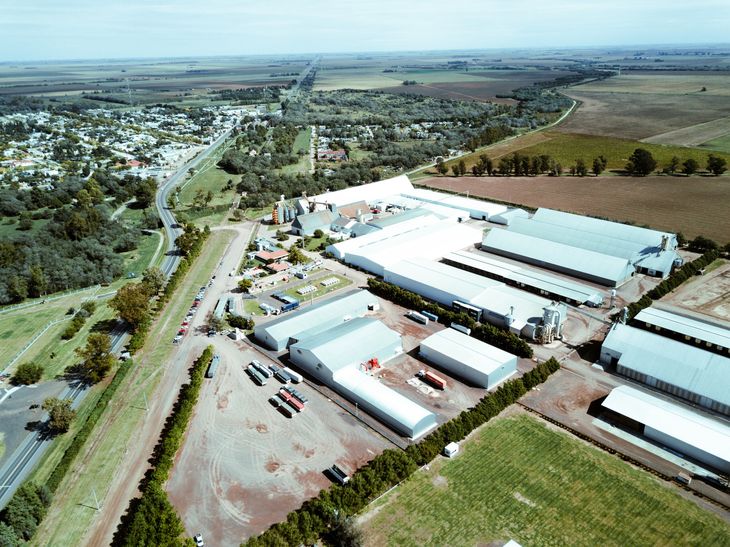Maniagro is one of the main peanut producing and exporting companies in Argentina, processing around 120,000 tons annually and managing more than 70,000 hectares. This company, located in the province of Córdoba, directly employs 550 people and is characterized by being vertically integrated, since it produces everything from the peanut seed to the finished product that it exports in bulk and sells in the domestic market in snack format. and own brand granola. Below, the vision of the leader of the firm, who advances his expansion plans for the domestic market, hand in hand with adding value at source.
Journalist: What were the beginnings of the company and how did they manage to position themselves as one of the main peanut producing and exporting companies in the country?
Daniel Cavigliasso: I come from a family that has always been dedicated to the agricultural business, both livestock and agriculture, and more recently we have experienced accelerated expansion. In 2008, part of the family decided to divide the businesses separately and thus Maniagro was born, which has its administrative headquarters in the town of General Cabrera, province of Córdoba, and the production plant in Carnerillo. We continue to raise livestock, but the heart of the business is the production and industrialization of peanuts. We currently manage about 70,000 hectares of which 50% are peanuts. We plant in Córdoba, Buenos Aires and La Pampa, most of it in rented fields where we respect rotation and sustainable soil management.
Q: You have also been present since the beginning of the business with seed genetics. What projects do you have with this business unit?
Personally, it gives me great satisfaction to be in all the links of the chain, because we ensure the traceability and quality of the products. Regarding the genetics of the seeds, we have our own varieties that we also multiply and market; we currently have around 60% of the national market. We are also working to soon expand with our own genetics in Brazil. We already have varieties registered and we hope in the next campaign, in association with processors from that country, to begin sowing fully.
Q: What is the mix between exports and the domestic market like today?
Maniagro, like all large companies in the sector, has the bulk of its business in exports, that is, Around 80% of what is produced and exported is destined for the foreign market, where the product is sent in bulk. Our products reach destinations such as Belgium, Spain, Holland, South Africa, the United Kingdom, Poland and Middle Eastern countries, among others. The remaining 20% goes to the domestic market, where there is still a lot to grow regarding value-added products. Peanuts have excellent nutritional quality and can respond to various nutritional needs; Personally, I am convinced that there is a lot of ground to gain, local peanut consumption is quite limited, so we have everything to continue increasing.
maniagro II.jpg
Q: Peanut butter managed to enter the main shelves, that could be an example.
Of course, andThe case of peanut butter is very notable.. Perhaps five years ago, very few people consumed it and it was only available in specific stores and now it has achieved a certain penetration into general consumption. In any case, peanut butter still has a lot to grow in consumption, as do other products such as snacks, bars, granola, even peanut oil, which is a by-product that we have and we are looking to return it to be used for consumption in the domestic market.
Q: This plan to grow in the domestic market includes the investment you made last year in the purchase of Croppers.
That’s right, Croppers is a company focused on the snack business for the domestic market and since we acquired it we have strengthened it and added more products to its portfolio and the plan is to continue increasing the offer. Today we have a market share of around 25% and we offer everything from roasted and salted peanuts, to chocolate peanuts, flavored peanuts, to peanut butter and GoNatural brand granola. We also do some white label for supermarkets, but to a lesser extent. So we are very happy with this acquisition and the plan is to remain strong in this segment.
Q.: Recently, you received a financing line from BICE of US$5 million. What will it be used for and how do you analyze access to credit for companies in the country?
Fortunately, our company has always been very well supported by local banks, we are constantly taking loans for working capital, since peanut production requires a lot of investment, Currently, planting one hectare costs around US$1,800. In parallel, we also invest in technology, for example, part of that BICE credit will be to install irrigation equipment and the other part for working capital. All of this allows us to be at the forefront and to be more sustainable every day. For example, before the end of the year we plan to inaugurate a clean energy plant, using waste from the industrialization of peanuts, more specifically the shell, which It will have the capacity to generate 3.6 megabytes that will be fed into the network with the purpose of offsetting our consumption.
Q: Finally, how do you analyze the peanut business in Argentina? What is its main strength today?
Peanut is a virtuous economy, Here in our area, within a radius of 250 kilometers there are more than 20 companies that are dedicated to producing and industrializing peanuts and that together employ more than 13,000 people and invoice about US$1.5 billion a year. Maniagro alone provides direct employment to more than 550 people and many others indirectly, we are in an oasis where unemployment is zero, A person is not unemployed for more than 24 hours because there is constant demand for labor. The agroindustry is a generator of work and foreign exchange and particularly peanuts is a business, which I reiterate, still has a lot to grow, so the balance is always more than positive. To the extent that the economic situation adjusts, the winds are more than favorable and that should not be missed.
Source: Ambito
I am an author and journalist who has worked in the entertainment industry for over a decade. I currently work as a news editor at a major news website, and my focus is on covering the latest trends in entertainment. I also write occasional pieces for other outlets, and have authored two books about the entertainment industry.




